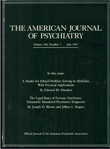TO THE EDITOR: Ronald L. Goldman, Ph.D., M.P.H., and colleagues (
1) reported on the sensitivity and specificity of four psychiatric utilization management criteria sets by comparing them to the consensus of judgments of a panel of expert psychiatrists who reviewed the same cases. Because of differences in the sensitivity and specificity of the instruments when compared to the panel's judgments, the authors concluded that “despite the difficulty of drawing a conclusion from a single study, our findings raise major concerns about the validity of the InterQual ISD [Intensity, Severity, and Discharge] psychiatry criteria. Continued use of these criteria appears questionable until they are modified and evidence of the validity of the revised criteria is presented.”
It is true that one goal of utilization management criteria is to mirror current medical utilization practices. This study, however, may mislead some readers into thinking that this goal is the only (or even the most important) goal of these criteria sets. The most difficult task of criteria designers is to strike a balance between current utilization practice and a more efficient utilization practice. By defining validity as equivalent to matching current practice, they will discourage future developers from “pushing the frontier” to challenge practitioners toward a more efficient use of resources.
Goldman et al. noted that “increased stringency in the 1993 InterQual ISD instrument probably led to its decreased sensitivity for continued-stay judgments as compared to the 1992 InterQual ISD Criteria.” As they noted, the increased stringency came about because the 1993 InterQual criteria set was the only one to require frequent nursing monitoring, daily psychiatrist contact, and treatments requiring an inpatient setting. Although stringent, these are not unreasonable requirements for continued stay. The purpose of stringent criteria is to create a system for early warning that a patient may be ready for a lower level of care.
The fear expressed in the article that “use of the 1993 InterQual ISD criteria may lead to acutely ill patients having their hospitalizations inappropriately abbreviated” is very unlikely to occur if the system is used as it is designed to operate. Utilization criteria are not designed to unequivocally state that a given patient should be discharged from the hospital, as there are too many factors that need to be taken into account. Instead, they are designed to bring the patient to the attention of the utilization review staff so that a dialogue with the attending physician is started, to determine whether a lower level of care for this patient is appropriate. If there is continued disagreement, the matter should be referred to the physician adviser to resolve.
While I believe that the Goldman et al. article is valuable for fostering new techniques for building physician consensus in review of medical records, its analysis of validity misses the mark. The InterQual criteria are not designed, nor should they be, to validate consensus practice.

